Who is Leading the Global 5G Race?
AI
8/6/20224 min read
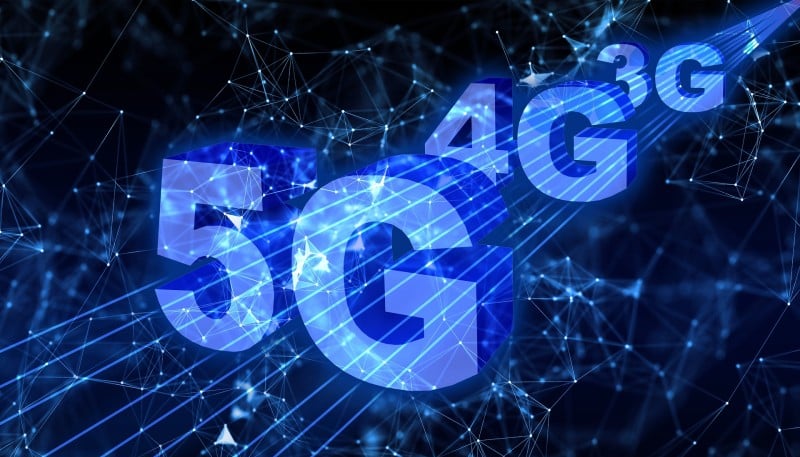

5G is estimated to increase global GDP by trillions of dollars. 5G can transform our lives, especially in areas like autonomous driving, IoT, VR or industrial automation. All major countries are heavily investing in 5G and fiercely competing to be the 5G winner. This poses the question: who is leading the global 5G race? To answer this question, let's first understand what is 5G and then look at 5G deployment status, 5G patents, availability and speed globally.
What is 5G?
5G refers to the 5th generation mobile network. "G" here means generation. 5G is a new generation mobile network after 1G, 2G, 3G, 4G.
1G (~1980-1990): 1G allows you to call someone on analog cell phones. The phones were very BIG. But at least it's wireless and mobile.
2G (~1990-2000): 2G allows you to use SMS and voice mail on your phone.
3G (~2000-2010): 3G allows you to do video calls, faster communication, better internet functions. 3G mobile phones started to be called smartphones.
4G (~2010-today): 4G allows you to do more with your phone, like streaming high-definition videos or playing mobile video games.
Now let's look at what is better about 5G compared to 4G.
1) High Speed: 5G speed can be up to 10 Gigabit per second (Gbps), which is 10 to 100x of 4G speed. With 5G, you can download a high-definition movie in seconds.
2) Ultra Low Latency: Latency matters a lot in mission critical applications like Vehicle-to-vehicle (V2V) communication or remote surgery. Theoretically, 5G latency can be as low as 1 millisecond. 4G latency on average ranges from 60 ms to 98 ms.
3) High Capacity: 5G has more capacity than 4G. 5G is designed to support a 100x increase in traffic capacity and network efficiency.
With high speed, ultra low latency, high capacity, 5G can enable new immersive mobile experiences such as VR, mission critical communications like V2V communications or remote surgery, massive IoT and much more.
Where 5G Technology Has Been Deployed
Below is a snapshot of where 5G has been launched/deployed or 5G investments made as of Jun 2022. Per a GSA report, by the end of May 2022, 493 operators in 150 countries and territories were investing in 5G. Out of those, a total of 214 operators in 85 countries and territories had launched one or more 3GPP-compliant 5G services.
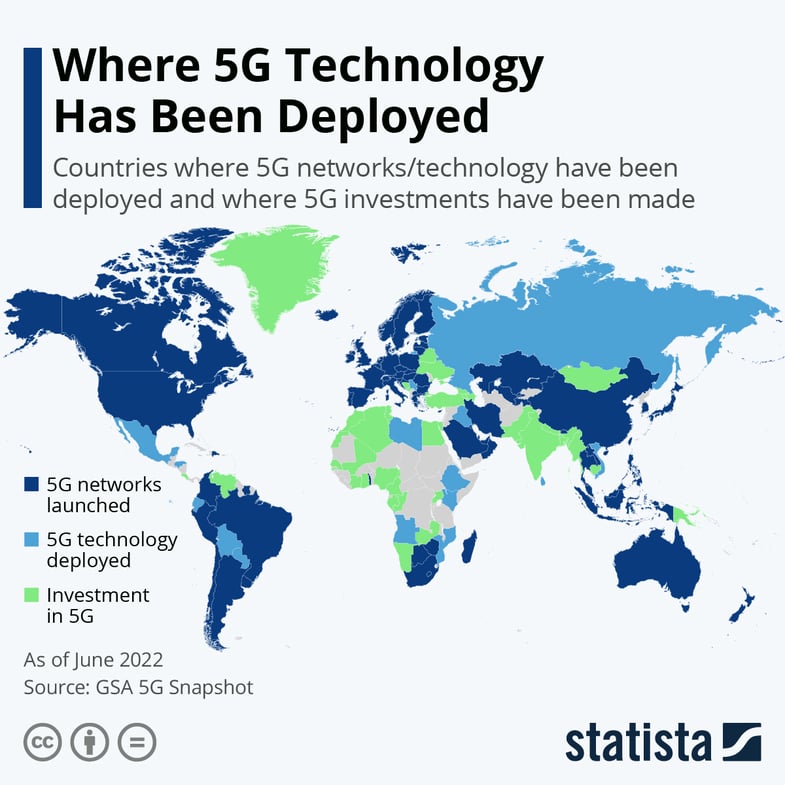

5G Patents: China ranks No.1 for total number of self-declared 5G patents while Europe ranks No.1 by 5G standards contribution
Majority of 4G patents are owned by companies in the US or Europe. However, China and South Korea have led in 5G with the highest number of self-declared 5G US or Europe granted patent families (see the figure below).
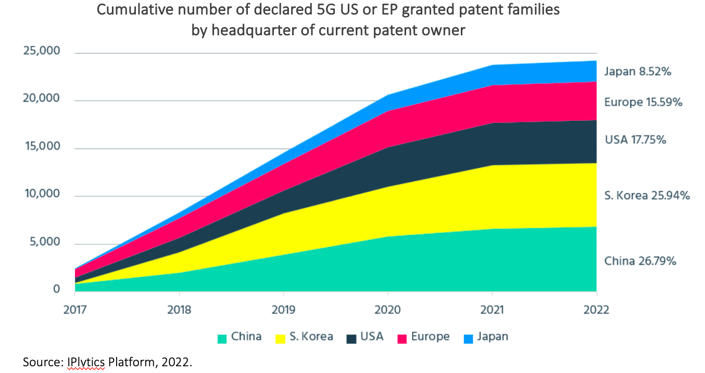

However, not all self-declared 5G patents are essential or valid. So we can't only look at the total number of self-declared 5G patents to measure which country is dominating the 5G patent race. Some self-declared patents are not valid. For the patents that are valid, some are essential to the 5G standards while others are not. Patents that cover core technologies of the 5G standards are called Standards-Essential Patents (SEP). Patents that are not core to the 5G standards (e.g. inventions on minor improvements) are called non-SEPs. The figure below shows the approved and agreed technical submissions to 5G standards development. Europe leads 5G standards contribution (37.04%), followed by China (33.96%).
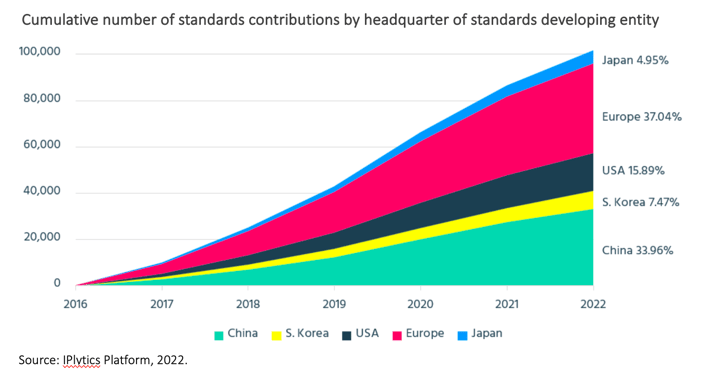

5G Availability: US ranks No.1
5G availability refers to what percent of users on 5G-capable devices spent the majority of their time on 5G, both roaming and on-network. Per market research company OOKLA, the US has the highest 5G availability (49.2%), followed by Netherlands (45.1%) and South Korea (43.8%).
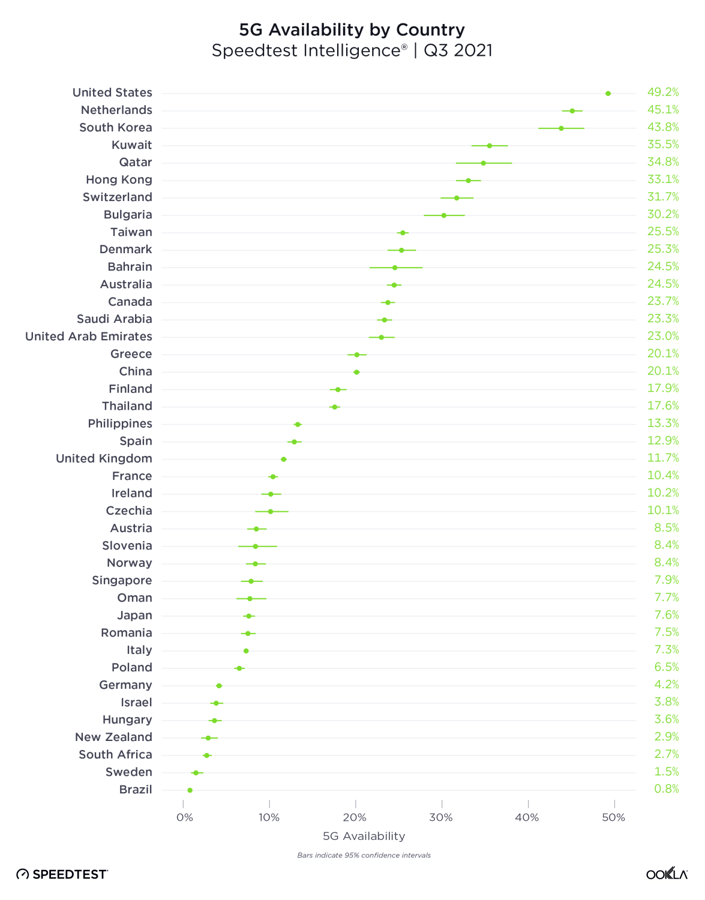

5G speed: South Korea ranks No.1
Not every 5G network are created equal. Some 5G networks are several times faster than others. South Korea ranks No.1 for median 5G download speed. Median 5G download speed in South Korea is 492.48 Mbps (fast enough to download a high-definition movie in less than 2 min), 5 times faster than the median 5G speed in the US. Even if South Korea's 5G speed is the fastest, it is still far slower compared to the highest theoretical speed that 5G can achieve (up to 10 Gbps).
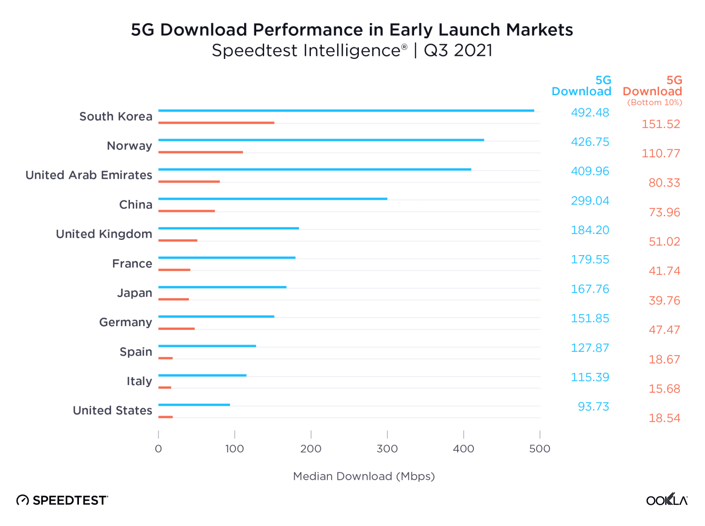

In summary, it's challenging to crown a global 5G race winner because no one country leads in all areas of the 5G race. For 5G patent race, China leads in terms of total self-declared 5G patents while Europe dominates by 5G standards contribution. For 5G availability, US is the highest, but US 5G speed is only 1/5 of South Korea's. For 5G download speed, South Korea is the highest. As 5G is still in early development stages, we don't know who will be the final winner yet. We should keep a close eye on the 5G developments in the future.
